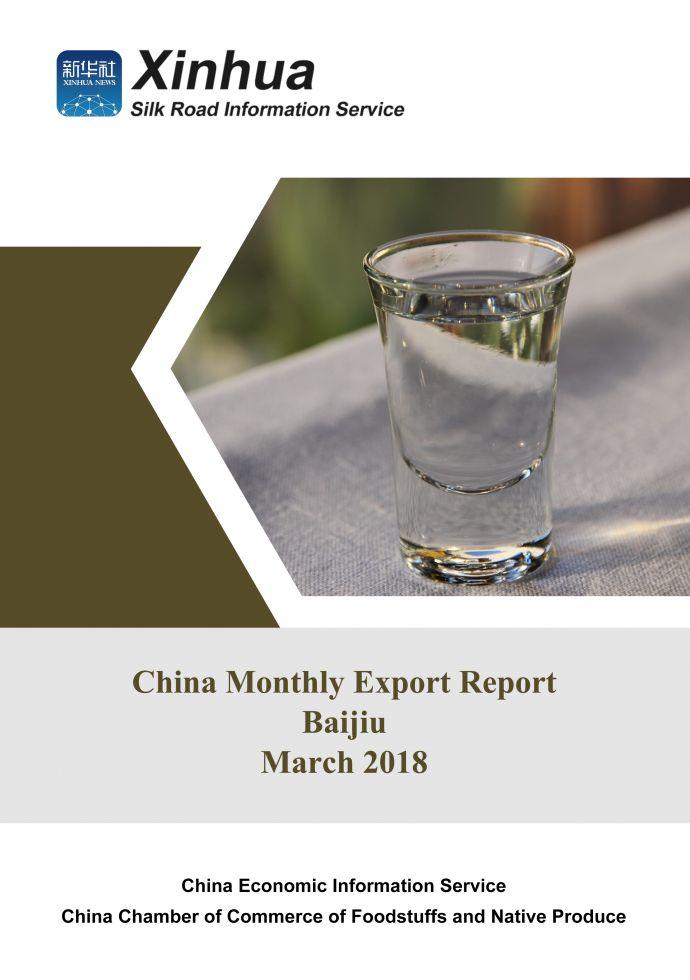China exported 4,012.5 tons of Baijiu from January to March 2018, a decrease of 6.2 percent year on year. The exports amounted to 82.3 million U.S. dollars, a decrease of 20.9 percent year on year. The average price was 20,520.8 U.S. dollars per ton, a decrease of 15.7 percent year on year.
In March alone, China exported 1,371.6 tons of Baijiu, an increase of 12.4 percent month on month. The exports amounted to 20.8 million U.S. dollars, a decrease of 22.6 percent month on month. The average price was 15,200.7 U.S. dollars per ton, a decrease of 31.2 percent month on month. Compared with March 2017, there was an increase of 8.1 percent in quantity, a decrease of 43.6 percent in value, and a decrease of 47.8 percent in average price.
In terms of export destination by continents, Asia imported 3,672.8 tons of Baijiu from China from January to March 2018, a decrease of 3.9 percent year on year, or 64.4 million U.S. dollars, a decrease of 5.3 percent year on year, at an average price of 17,527.3 U.S. dollars per ton, a decrease of 1.5 percent year on year; Africa imported 10.5 tons, or 132,676 U.S. dollars, at an average price of 12,597.4 U.S. dollars per ton, as compared with no export reported in the same period of last year; Europe imported 64.9 tons, a decrease of 71.9 percent year on year, or 7.8 million U.S. dollars, a decrease of 68.1 percent year on year, at an average price of 120,557.3 U.S. dollars per ton, an increase of 13.4 percent year on year; South America imported 3.4 tons, a decrease of 43.0 percent year on year, or 76,551 U.S. dollars, a decrease of 93.3 percent year on year, at an average price of 22,383.3 U.S. dollars per ton, a decrease of 88.3 percent year on year; North America imported 191.3 tons, an increase of 17.7 percent year on year, or 6.8 million U.S. dollars, an increase of 9.1 percent year on year, at an average price of 35,712.3 U.S. dollars per ton, a decrease of 7.3 percent year on year; Oceania imported 69.5 tons, an increase of 18.4 percent year on year, or 3.1 million U.S. dollars, a decrease of 26.8 percent year on year, at an average price of 44,558.1 U.S. dollars per ton, a decrease of 38.2 percent year on year.
In March alone, Asia imported 1,281.1 tons of Baijiu, an increase of 18.1 percent year on year, or 15.1 million U.S. dollars, a decrease of 25.4 percent year on year, at an average price of 11,811.8 U.S. dollars per ton, a decrease of 36.8 percent year on year; Europe imported 13.8 tons, a decrease of 86.4 percent year on year, or 2.4 million U.S. dollars, a decrease of 79.1 percent year on year, at an average price of 177,387.7 U.S. dollars per ton, an increase of 53.4 percent year on year; North America imported 35.1 tons, a decrease of 53.0 percent year on year, or 1.0 million U.S. dollars, a decrease of 74.0 percent year on year, at an average price of 28,633.2 U.S. dollars per ton, a decrease of 44.6 percent year on year; Oceania imported 41.7 tons, an increase of 400.1 percent year on year, or 2.3 million U.S. dollars, an increase of 96.4 percent year on year, at an average price of 54,571.0 U.S. dollars per ton, a decrease of 60.7 percent year on year.
Among all the countries and regions that imported Baijiu from China from January to March 2018, in terms of value, Hong Kong ranked first with 42.9 million U.S. dollars, an increase of 14.7 percent year on year; Singapore ranked second with 7.0 million U.S. dollars, a decrease of 34.0 percent year on year; the United States ranked third with 4.9 million U.S. dollars, a decrease of 14.0 percent year on year.
In March alone, Hong Kong ranked first with 9.1 million U.S. dollars, a decrease of 8.0 percent year on year; United Arab Emirates ranked second with 3.0 million U.S. dollars, as compared with no export reported in the same period of last year; Macao ranked third with 1.3 million U.S. dollars, a decrease of 62.7 percent year on year.
For the full report, please download the following PDF.




 China Monthly Export Report on Baijiu (March 2018).pdf
China Monthly Export Report on Baijiu (March 2018).pdf A single purchase
A single purchase









